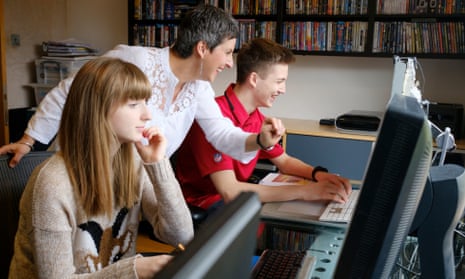For Marta Drew and her family, it was a difficult decision, but the right one. Eight years ago, she says, her seven-year-old son had been complaining about school. “Christopher, who was a bright, curious little boy, started saying things like ‘I hate learning’ and ‘learning is boring’. So I started reading up about home education.
“Initially my husband thought I was out of my mind. But he read up about it, too, and within three months we had decided to take our children out of infant school. We have enjoyed it enormously.”
Drew, who supervises the increasingly self-directed learning of Christopher, now 15, and his sister, Alicja, 13, from the family base near Reigate, Surrey, is a former marketing account manager. She gave up her job when Christopher was born, had a part-time business selling jewellery when her children were infants but then gave that up to home educate. Her husband, Martin, a graphic designer, remains the breadwinner, commuting to London, but is an active supporter of activities outside work hours, such as football for Christopher and drama for Alicja.
Drew says the children’s learning was more directly provided by her when the children were young. Now, she works out their weekly study schedule – which is supplemented by online tutoring through organisations such as MyTutorWeb and sports and cultural activities – and largely lets them get on with it.
The Drews are seemingly part of a fast-growing trend towards home education. Nobody knows exactly how many children are being educated at home because many parents are under no obligation to tell the authorities. But freedom of information responses provided to Education Guardian indicate numbers are rising. Responses from 134 of England’s 153 local education authorities list 30,298 children as receiving home education in 2014-15. Of these, 13,007 are of primary age, and 17,291 of them are between 11 and 16.
Among 103 authorities that provided data back to 2011-12, the number of primary–age children recorded as home educated rose by 60% in the three academic years to 2014-15. In the secondary phase, the increase was 37%.
In some of England’s largest local authority areas, hundreds of young people are being home educated: Kent listed 1,285 children; Essex, 1,234; Norfolk, 1,052; and Lancashire, 918. About 85% of local authorities documented a rise in home education over those three years, with 27 authorities reporting a doubling of numbers.
This may be part of a longer trend. Last December, the BBC reported home education numbers had risen 65% across England and Wales in the six years to 2014-15, while in 2007, Channel 4 News documented a 61% increase in home educated children in the five years from 2002.
Pinning down reasons for the rise is tricky. Eleanor Reardon, who set up a legal advocacy service for home educators three years ago, says parents have various motivations. “They tell us: ‘I cannot get my child into a school locally. The local authority has said I have to send them however many miles away, so I am considering home education.’ Or ‘My child has been sick’, or ‘My child has special needs, but the school is threatening to fine me or take me to court because he’s not been in school.’”
And, more recently, “There has also been a huge rise in special educational needs cases which are not being catered for,” she says.
Reardon and other home education experts say part of the rise may not relate to schools. The Education and Inspections Act 2006 introduced a requirement for local authorities to identify children not receiving school education. This is likely to have triggered more systematic record-keeping.
In 2009, a review of home education for the Labour government by the former children’s services director Graham Badman prompted media coverage, meaning, says Reardon, that more parents became aware of the possibility of home education. The rise of social media has also helped to alert parents to the possibility of home education and to provide support networks.
Although the proportion of people home educating is still low – our figures indicate it accounts for 0.5% of the total pupil population – some within the field suggest the numbers make an interesting commentary on perceived weaknesses of English education policy.
Elizabeth Lil, a former science teacher and musician who recently moved to St Andrews in Scotland having home educated her two children in London and Bedfordshire, says some parents are rejecting the pressure they feel pupils are being put under in schools. “The testing [in schools], and all of the target-setting, only suits a proportion of the pupil population,” she says. “A lot of children are being put off education too early because of the literacy requirements. It’s particularly bad for boys, who are not always disposed to sit still for long periods.”

Helen Lees, an expert on alternative education and lecturer at Newman University, Birmingham, says England’s mainstream education system is in danger of alienating both children and staff. She says: “I had a conversation with a senior leader in a free school that is part of an academy chain recently that was very concerning. Talking about what happened in reception [class], she said: ‘It’s really formal. We have them sitting down doing maths and English all morning, every day.’ I said: ‘How do the children feel about that?’ Smiling, she said: ‘Our [test] outcomes are fantastic.’ Many people don’t want this for their children.”
Two expert sources separately suggested that home education numbers may be rising in part because of schools trying to get certain pupils off their books, so they do not count in league tables, as suggested recently by headteacher Vic Goddard. Parents might be asked by the school to agree to home educate, with a veiled threat that their child could be excluded.
A former attendance officer at a school run by a successful academy chain told us her “life was made hell” by her headteacher when she refused to collude in what she said were “illegal” moves to remove struggling pupils from the school roll.
She said the school threatened parents of children it wanted to ease out with permanent exclusion if they did not agree to teach them at home. The source said the school had also been “hiding” low-achieving students from official exam result data by registering year 11 pupils, who take GCSEs, as being in year 10.
A former teacher now working as an academic also told us that, when working in a secondary school, he had asked parents to sign a form to say they would home educate their child, having been put under pressure by his headteacher in an attempt to improve results.
But this is only one part of the story. Data from one of England’s larger local authorities, Dorset, shows the reasons given by parents for taking their children out of school. Among the 776 pupils recorded as home educated in 2014-15, which Dorset said was a “record”, the most-cited reasons were “dissatisfaction with school environment” (mentioned by 184 parents) and “lifestyle/cultural/philosophical” (178). After that came “medical-child” (42), “bullying” (25) and “not preferred school” (20). “Near exclusion” was selected by two parents.
Dorset has 46,058 pupils of compulsory school age, so the numbers are still fairly low. And some areas of England, such as the north-east, have tiny numbers being home schooled: the four authorities of Middlesbrough, Stockton-on-Tees and South and North Tyneside had only 105 children recorded as home educated in 2014-15.
It is unclear how the Department for Education’s white paper, which proposes to end local authorities in their current form by 2022, will leave the monitoring of pupils receiving home education. The education secretary, Nicky Morgan, has called for a review to consider a compulsory home-schooling registration scheme involving local authorities, partly to guard against radicalisation, but this is controversial. Unless a family is rejecting the offer of a school place, there is currently no obligation for them to inform anyone of their decision to home educate.
Home education, for which Marta Drew admits a lot of commitment is needed as well as, perhaps, the right family income, seems likely only ever to be an option for a small minority. Yet home educators believe the trend is likely to continue.
Christopher Drew sat his first GCSE in January, more than a year early, and got an A*. Marta Drew says: “The decision to home educate has been one of our best as a family. We have grown closer, and the children have grown in their love of learning. They are happy, enthusiastic children who love life.”










Comments (…)
Sign in or create your Guardian account to join the discussion